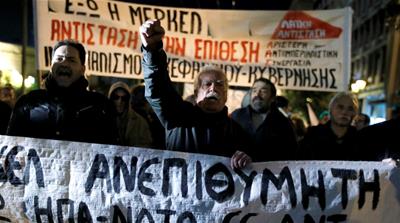
German Chancellor Angela Merkel left Greece on Friday after an unusual show of support for the left-wing government of Alexis Tsipras and disdain for her fellow conservative, opposition leader Kyriakos Mitsotakis.
What caused this reverse-polarity was the agreement between his government – led by his Syriza coalition – and the Former Yugoslav Republic of Macedonia (FYROM) last year to change that country’s name to North Macedonia.
That agreement has led to a series of constitutional revisions by Greece’s neighbour, expected to be finalised this week. The onus will then be on Greece to ratify the agreement.
The country’s veto on North Macedonia joining NATO and the European Union would then be lifted.
“I am especially grateful to Alexis Tsipras for taking the initiative on a very difficult problem,” Merkel said on Thursday, praising his “great courage”.
Merkel had less kind words for Mitsotakis, leader of the New Democracy party, which vows to vote against the agreement.
New Democracy’s opposition has been compounded by the refusal of Syriza’s junior coalition partner, the right-wing Independent Greeks, to ratify the agreement.
That leaves Tsipras six votes short of the 151 he needs in the 300-seat legislature.
“On matters of great national importance, there must be an effort to find a common position. That is what I support. But I am under no illusion as far as [party] positions are concerned. I am sure a German chancellor’s visit won’t change them.”
Syriza insists that it will muster the votes by stealing sympathetic MPs from Independent Greeks and Potami, a centre-right reformist party. Merkel’s visit was a reminder to those MPs that Europe is watching what Greek lawmakers do.
Merkel’s three previous visits to Greece – in October 2012, November 2013 and April 2014 – were designed to support then-conservative economic reforms, which balanced the budget. Syriza controlled the streets, and helped orchestrate massive protests in which Tsipras called New Democracy “collaborators” and “Merkelists”.
On Thursday, however, Tsipras warmed to Merkel’s presence remarkably well. Asked about his shift, Tsipras appeared to try to justify his about-turn from austerity opponent to austerity enforcer when he came to power in 2015.
“When you’re prime minister, you have to represent everybody… those who protest and those who fear protests… the unemployed and those who work and are afraid of losing their jobs… those who have nothing to lose and those who have life savings.”
Athens University history professor Thanos Veremis said: “Those who were protesting then are now in power.”
“They are running the country, and they have been on very good terms with Merkel since they took over in 2015. Tsipras has been like her long lost nephew from the Balkans,” said Veremis.
Tsipras’ great U-turn has become a politically useful image for Merkel, who is beset by a Eurosceptic far-right opposition at home and in her central European neighbourhood.
Italy’s interior minister, Matteo Salvini, has announced a “new European spring” as he prepares a Eurosceptic alliance ahead of European Parliament elections in May. The alliance is to include France’s “gilets jaunes (yellow vests)”, Germany’s Alternativ fur Deutschland, and Poland’s ruling Law and Justice Party, among others.
These anti-establishment forces arose as a result of post-2008 economic crises and the post-2015 immigration crisis in Europe. Greece arguably suffered the worst of both and produced the left-wing Syriza government, which ultimately compromised its anti-establishment principles to keep Greece in the Eurozone and the European Union.
Holding up this example of a once-rebellious party that was tamed by common sense, as Merkel would have it, is now a powerful political tool.
Although Greece was cleared to borrow from markets last August, officially graduating from eight years of Eurozone oversight, it still hasn’t sold any multi-year government bonds. Markets are evidently spooked by its still-high taxes and unemployment, low growth and high loan repayment costs.
“They haven’t really gotten out in the sense that the economy isn’t really doing that well yet, and we can’t go to the open markets,” says Veremis. “Nevertheless we are out of it, and [Merkel] might very well use that as a reason for rejoicing over the EU’s policy vis-a-vis Greece.”
The street is still angry
This realpolitik, however, remains far from sentiment on the Greek street, which feels the pain of spending 2.2 percent of GDP repaying emergency loans to European institutions for the next 40 years.
Germany was instrumental in enforcing austerity measures in return for those loans throughout Europe, but nowhere was more money spent and more austerity enforced than in Greece.
 |
| While Tsipras has warmed to Merkel, many Greeks protested her visit [Alkis Konstantinidi/Reuters] |
“Germany wants this situation with all the austerity measures to continue. It doesn’t want any upheaval or complications,” said lawyer Paris Papadakis, explaining the reason behind Merkel’s visit.
“It wants to secure German interests. That means paying off our loans, it means promoting German industrial interests. Greece no longer depends on its own strengths, but on external powers.”
Restauranteur Ioannis Meraklidis agrees.
“[Merkel] hasn’t helped Greece… We’re under Germany right now. Our children and grandchildren cannot be condemned to paying off loans until 2060. Something has to happen. We need to free ourselves from the German establishment.”
Merkel’s visits have inevitably awoken memories of the last time Germany held direct power over Greece – the Nazi occupation of WWII, which bankrupted the economy as taxes were raised, agricultural produce was siphoned off to Germany and a $230m loan (according to exchange rates in 1945) was forcibly extracted from the Bank of Greece.
These sentiments are aggravated by the fact that Germany refuses to discuss reparations or repayment of the wartime loan.












